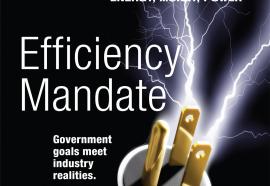Green with Envy
Efficiency products will proliferate, for better or worse.
Recently an acquaintance of mine, who shall remain nameless, gave a diamond engagement ring to his girlfriend. She joyfully accepted the ring. But soon her joy turned to disgust when she learned that her lovely “diamond” actually was a cubic zirconium. Last I heard, she’d broken off the engagement and was dating her ex-fiancé’s former boss.







